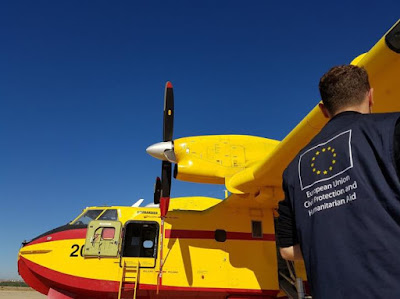Filenews 5 July 2021 - by Michalis Hatzivasilis
After the fire in the area of Salia which was considered to be one of the most destructive, one would expect that much would change in the field of firefighting. In particular, after a Commission was set up which studied weaknesses and shortcomings and made suggestions.
One of the suggestions was to strengthen firefighting forces by flying means. In fact, the two-member Committee set up by decision of the Council of Ministers had recommended the purchase of two flight instruments, not helicopters, but aircraft. In 2018, under Minister Ion Nikolaou, the purchase of two Canadair planes was launched, but this never happened. As is often the case in the public sector, while a decision is taken, it is ultimately not implemented. The same thing happened with the Coordinating Centre which never happened and we stayed with the "canteen" as the existing Ion Nikolaou had described.
As for the two helicopters, since there was a lot of thought about whether they would be bought or rented, there was a decision to buy. However, the relevant ministers and co-competent departments, according to information provided by "F", also looked at the idea of working with a large company with 12 flight instruments to give it a base in Cyprus (Paphos airport) to rent us the two flying instruments we needed and the rest in other neighbouring countries. At the same time, in the case of major incidents as now, it would have other means of firefighting.
And while discussions were taking place on these two options, a proposal came from the then Commissioner for Humanitarian Aid and Crisis Management, Cristos Stylianides, to set up a rescEU body in the Cyprus-based region, which would include Greece, Italy, Portugal, Spain and countries in the region such as Israel by flying means. , Egypt and Lebanon, to deal with rescue incidents and to deal with fires. In the end, while things went a long way, this did not materialise and so Cyprus was left with the flying means at its disposal, without acquiring firefighting planes and without becoming the base for the rescEU.
The Commission, which studied the gaps in the fire in Solia, had also recommended the creation of a Coordination Centre which would be transferred to each major incident and from there instructions would be given to firefighting instruments, whether by air or ground. In 2019 it was decided to buy a Centre with great potential that could be joined up with a satellite for a picture of fire from space, with televisions, electronic maps, etc., but the offer launched for some 1.5 million euros was overturned with an intervention by the Audit Office which it considered high. Efforts were made to supply a smaller and cheaper Centre, but things never went ahead.
In the same expert report (prepared by Professor Georgios Bustras and the former Director of the Fire Department Georgios Hatzigeorgiou), a proposal was made to regulate the issue of volunteers, promote the self-defence of the Fire Brigade and purchase special cameras to get an image of the helicopters. This was only recently the self-government of the Fire Brigade and the Law on Volunteer Firefighters (passed a month and a half ago).
We didn't learn from 2016 says Marcos Tragalas
The former director of the Fire Brigade Markos Tragalas appeared strongly in his statements to "F" both on the volatile instruments that were not purchased and on the issue of coordination. Inevitably he compared the fire of Solia and said that now the fire was so rapid due to the winds and the morphology of the ground, where in one day they burned more than 40 km, while in Solia in 4-5 days burned an area of 18km. As he mentioned, the first "knock" of the fire is the most decisive. The day before yesterday there were other fires under way before that in Arakapas where they were attempting flight instruments, so they needed refuelling and their personal rest, and so there is a delay in responding en masse to all flight instruments. If we had more to patrol equipped with water, we would be more effective, he stressed. There is no doubt that more fire engines are needed from the air for patrols and for the first throws that are decisive before the fire spreads, he noted.
Moreover, Marcos Tragalas confirmed the information that the study carried out after the deadly fire in the Soleas region spoke of strengthening the flying means, which was ultimately not carried out. "We are not ready for the worst-case scenario. We didn't learn from Solia," he concluded.
